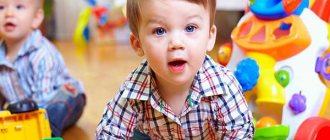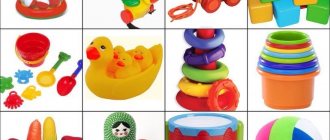Why does a child need to go to kindergarten?
Experts are confident that for full development, character formation and integration into the social environment, it is better for children to grow up in a team than to constantly be at home with their mother, grandmother or nanny.
Psychologists insist that the optimal option for a child’s adaptation to society is kindergarten.
In a group, a child not only learns to communicate with other children, but also gets used to independence
Visiting kindergarten has its positive sides:
- the child learns to interact with other people. And we are talking not only about children, but also about adults, because the baby gets to know several teachers, a music director, a psychologist and other kindergarten employees;
- psychologists and teachers note that children begin to develop faster in a group. The secret of this is simple: a child who did not want to complete tasks at home, watches his peers, and wants to be the first, the best, and also strives to learn certain skills. The instinct of leadership and competition awakens in him;
- teaching discipline: a very important moment for a growing child. Today, many parents encourage free upbringing, when a child can do anything. But it becomes very difficult for such children at school, where there are no more games, but they need to complete the teacher’s assignments. It is in the kindergarten that children get used to discipline in a playful way, and by the senior preschool age they already realize what can be done and what cannot;
- organizing a daily routine: doctors around the world insist that teaching a child to a certain routine has a positive effect on his development. If a child does not know what a regime is until he is two or three years old, in the garden in a few months the body will get used to the new rules. And after graduating from preschool, the child will not have problems at school, because everything there is also on time and schedule;
- shows independence and character: when the mother is not around all the time, the baby begins to analyze many situations himself and make decisions for which only he is responsible.
Very often, it is in the garden that a child develops a good appetite, and parents cannot get enough of it, because before their baby could not be forced to eat normally
Should I send my child to kindergarten - video
Preparation
If you have taken into account all the recommendations, you can begin preparing for kindergarten.
Of course, for children aged 2 and 3 years there are differences in the possibility of preparing for life in kindergarten
So, what should parents of two-year-old babies do?
- A month before going to kindergarten, the little one must be weaned from breastfeeding, or weaned off the pacifier. This is too much stress on the nervous system if the breast or pacifier is taken away right at the entrance to the garden.
- Try to retrain your baby to drink from a sippy cup or bottle. Buy him some nice glasses and gradually teach him to drink water or other liquids this way.
- Potty train your baby. Even if there are some mistakes at first, stock up on diapers and plenty of clean clothes.
- Try to demonstrate to your child how to dress independently. How to take off your pants, put on your shoes, and put on your jacket.
- Teach your child to communicate with other children. Talk about how to communicate with children and what not to do, for example, throwing sand in their faces.
- Teach your baby to order. Teach him to put away his toys and put things back where he took them.
Children aged 3 years have slightly different requirements.
- A child at this age should already be able to eat with a spoon. If for some reason the baby does not know how to eat or drink on his own, it is necessary to urgently work on this.
- The baby must be able to undress and dress independently. This also applies to shoes.
- The child must already be weaned off diapers and go to the toilet on his own. In younger groups, it is no longer pots that are installed, but small toilets, which the child must be able to use.
- Often talk with your child about what is happening in kindergarten, what he likes or, on the contrary, does not like. The baby should feel his parents' interest in his life.
- And finally, do not forget that all the time the child needs to be taught to interact with other children, and also to be taught order.
What is the reason: the child cannot get used to kindergarten
No matter how good the kindergarten is, it is a lot of stress for a child who is just starting to attend it. Psychologists explain: the baby is used to constantly being with his mother or other relatives, and suddenly he is left in unfamiliar territory with complete strangers. Of course, the baby does not perceive this event in the context that he was abandoned, this is not so. But some children may not like new rules, routines, or discipline. However, not all children are hostile to preschool. Experts have found that a child who knows from birth what a routine is, knows how to clean up toys after himself, is used to studying and doing various exercises, will see in a group an opportunity to express himself, make more friends and show off his skills.
In most cases, children cry and are capricious at first and do not want to go to kindergarten. This is called the adaptation period. Psychologists reassure parents that for the first two to three months such behavior is considered normal. Even if the child likes the teachers, new friends and the environment in general, he may cry and miss his parents. But later the baby will begin to perceive the garden and will happily run to the group.
Successful adaptation largely depends on the parents: first of all, you need to find out what the baby doesn’t like or is it just a desire to be with his mother longer
Reasons why a child does not want to go to kindergarten at 2 and 3 years old - table
| 2 years | 3 years |
| Often children at this age are still breastfed or sucking on a pacifier. The inability to receive breastfeeding at any time is very stressful for a baby who is used to it. The same applies to pacifiers: in most cases, teachers are against the baby taking the pacifier with him to the group. | Not used to the routine: children who are accustomed to doing everything at any time and are not controlled by the daily routine often do not want to go to kindergarten. It is much more difficult to accustom a three-year-old to a certain daily routine than a two-year-old. |
| Inability to do many things independently: two-year-old children cannot yet fully dress themselves, hold a spoon and scoop up food, some cannot even drink from a cup, but only from a bottle or sippy cup. The teachers, of course, will help the child, but they will not be physically able to devote time to him alone. | They don’t want to eat the food offered in the garden. This problem is familiar to many parents: the older the child, the more difficult it is to accustom him to unfamiliar dishes. By the age of three, the baby has already decided on his favorite dishes, so he does not want to try something new. |
| Fear: children, especially small ones, are often afraid that their mother simply will not come back for them. To do this, you should talk to the child more often, explain that in the evening the parents will definitely take him home from the group and nothing else. | |
| I don’t like the teachers: perhaps the baby is simply not yet accustomed to new adults whom he must obey as parents. It is worth talking with your child about this, because there are situations when teachers offend children. But a two-year-old baby cannot yet fully express his thoughts. Therefore, before sending a child to a group, parents are advised to get to know the teachers, spend some time in the group and observe the methods of raising children. If the teacher’s principles differ from the views of the parents, it is worth finding another group or kindergarten where mom and dad will be satisfied with everything. | I don’t like doing tasks: putting away toys, doing various exercises. You also need to get used to this, parents understand that the child needs to be taught order, to develop him not only psychologically, but also physically. As soon as the baby gets used to new friends, he will want to do all the activities with them. |
| Unfamiliar surroundings: children get used to their home or apartment, park or playground. But suddenly they are left on foreign territory for a long time. Don’t worry, the baby will definitely begin to perceive the kindergarten as family, but this takes time. Psychologists recommend that at first you must give your child a favorite toy or several in the group: he will sleep with one and carry the other with him to the playground. This way the baby will feel not alone in a new place. | |
How to get your child used to kindergarten without stress?
Kindergarten is the first social environment for a small child. The beginning of his visit will inevitably cause a state of stress. After all, these are new conditions and rules, new children and adults around, the need to get acquainted and learn to communicate with others.
And also - a separation from the mother, with whom the baby is accustomed to spending almost all his time, a test of independence.
How to properly accustom your child to kindergarten, help him adapt to new conditions with the least loss for his delicate psyche?
Age imprint
One of the main conditions for a child’s successful adaptation to the children’s group is the correct age. A child can be sent to a child care institution at both 2 and 4 years old - it all depends on the capabilities of the family. Each age may have its own problems that you need to be prepared for.
For example, it is quite difficult for two-year-olds to learn to take care of themselves (eat, dress, use the potty). In addition, due to the lack of sufficient experience, they practically do not know how to establish contact with other children: get to know each other, play together, share toys.
At the age of three, children experience an age crisis when they become aware of themselves as a separate, free, significant person. Depending on the severity of the crisis, the severity of adaptation to kindergarten will also be different. But one stressful situation will inevitably overlap. Therefore, psychologists do not recommend sending children to kindergarten until the crisis subsides.
By the age of four, a child knows how to take care of himself and can make friends and play with other kids. But established habits can have an impact here: being with your mother at home, following your own routine and following your own rules. Breaking these foundations is more difficult with age.
Therefore, to select a child for kindergarten, it would be optimal to choose a period between 3 and 4 years.
Try not to combine the process of adaptation to kindergarten with other stressful situations (divorce of parents, moving to a new place, death of a loved one, birth of a youngest child).
How long will the adaptation take?
This question worries parents perhaps most of all. Everything will depend on many factors:
- baby's age;
- the presence of a parallel stressful situation;
- parents have other children;
- degree of child custody;
- the level of his dependence on his mother;
- uncertainty, anxiety of the baby;
- immunity strength;
- stability of the nervous system;
- degree of openness, sociability of the baby, etc.
Depending on these factors, adaptation can occur with varying degrees of complexity:
- Easy. It goes away on average in 3 – 4 weeks, without any particular scandals or hysterics (but not without them). The kid quickly makes friends among his classmates and learns to trust the teacher. He happily talks about everything that happened to him during the day; he is interested in going to new friends again. His speech develops quite quickly.
- Medium (most common). It can drag on for 2, and sometimes more, months. The child perceives kindergarten as a punishment for a long time, does not want to go there, wakes up in a bad mood, and is capricious. He may say that it seems normal in kindergarten, but he doesn’t want to go there. This is due, first of all, to the breaking of foundations: at home he himself established the rules of the game and norms of behavior, but here he has to reckon with others and obey.
- Severe (quite rare). It is usually typical for children with developmental delays and mental problems. But sometimes it can also manifest itself in ordinary children who grew up spoiled, did not know failure and turned out to be completely unprepared for new living conditions. Also “at risk” are children from disadvantaged families. It is extremely difficult (and sometimes impossible) to accustom such a child to kindergarten. If a child systematically does not listen to the teacher, is rude to him, ignores the daily routine of the kindergarten and the rules of behavior adopted here, you should pay close attention to this. Such a child, during a general lesson, can demonstratively do something of his own and get angry, reacting to comments; he is aggressive and hostile towards other children: he hits them, pushes them, takes away their toys. In this case, the child and mother should visit a child psychologist. If the specialist concludes that it is possible for the child to stay in kindergarten, then it is better for the child to sit out the time of correctional work with a psychologist at home. If adaptation is impossible, the baby will be sent to a special correctional kindergarten.
Parents' actions: how to help their child adapt to kindergarten
Properly preparing a child for the start of kindergarten is the task of parents. If you bring your baby to a group one morning and leave him there, this situation will definitely cause hysterics and fear in the baby. Therefore, there are recommendations that are voiced not only by educators, but also by child psychologists:
- First of all, you need to tell your child what a kindergarten is and why children are brought there. The child, even though he is still small, already understands everything. The main thing is to interest the baby, explain what is interesting there, there are a lot of new friends and toys, etc.;
- You shouldn’t immediately leave your baby for the whole day. It is recommended to first take the child for two hours so that the baby can play, but not have time to miss his mother. During the first week, you can bring your baby in the evening for a walk. From the second week, it is better to bring your baby to breakfast and leave it no longer than two hours. At this time, children are playing in the street. Then increase the time until lunch so that the baby gets used to eating with all the children. And only after that start leaving it for the full day. In most cases, this period takes one month; after 30 days, the child can already be left from morning to evening;
- Be sure to explain to the child that his parents will come for him in the evening, so that the baby does not think that he can be left in the garden forever. Psychologists recommend that for the first few days you should bring your child for a few hours in the evening so that he can see how parents pick up other children. This way the baby will be calm and confident: his parents will definitely come for him in the evening after sleep and afternoon snack;
- Before the first visit, it will be useful to talk about the teacher: who he is, why this particular person must be obeyed in everything. The child must come to the group and understand that for some time of the day it is the teacher who replaces the mother or another adult;
- The baby must constantly feel the support of his parents, because the baby perceives everything on an emotional level. Parents and grandparents should speak well of the kindergarten, encourage the child and constantly praise him. If a child constantly hears positive reviews about the kindergarten, in his mind the group and teachers will be associated with a very good place. And that is where his parents are taking him;
- You need to gradually accustom your baby to kindergarten: in the first few days you should not force your baby to have breakfast in a group; it is better to feed him at home. A well-fed child will be better able to accept games and participate in them. Later, the baby will see how other children eat at the table and will definitely want to join;
- After the weekend, children often begin to be capricious and do not want to go to the group. Therefore, parents are advised not to leave them all day on Monday; it is better to postpone this until Wednesday or Friday;
- psychologists recommend coming up with your own farewell ritual in the morning: hugging, kissing or clapping your hands, telling a rhyme. This process must be quick so that the baby cannot delay the moment when the mother needs to leave. The child gets used to the same actions and after a while will begin to part with his parents in the morning without tears.
Psychologists recommend getting your child accustomed to a routine before starting to attend kindergarten. This will make it easier for your baby to get used to the new environment.
Experts recommend sending children to preschool in the summer. At this time, there is less chance that the baby will get sick. And children spend most of their time outside, so it’s easier for the child to adapt. If you start attending preschool during the cold season, your baby may get sick a few days or weeks after the start of group visits. The child will be on sick leave for at least 7-10 days and adaptation will fail, because the baby will again get used to being at home. From the moment of recovery you will have to start all over again.
Video: adaptation in kindergarten, practical advice from a psychologist
Do I need to prepare my child to start kindergarten?
The answer to this question is definitely yes. The success of adaptation largely depends on whether the child is ready to attend the group. Experts recommend starting preparation 4-6 months before you plan to start attending kindergarten.
How to get your child used to kindergarten at 3 years old
Recommendations for adapting your baby to kindergarten
Although teachers and psychologists in kindergarten note that the speed of adaptation varies from child to child, as a rule, it is recommended to begin teaching the child to remain in his children's group at least a week in advance, and preferably two, during which one of the parents will come with the baby to kindergarten and gradually stay there longer and longer.
The psychologist advises using the opportunity to stay with the baby in the group on the first day in a nursery or kindergarten.
Plan a few days of vacation so that you can be there during the period of getting used to the kindergarten. This will help you see how everything works there, and you will feel calmer and then convey your calmness to the little ones.
Schedule of first visits to kindergarten
Gradually lengthening your stay in kindergarten is important because it makes it easier to adapt to new living conditions. To accustom your child on the first day, you can stay with him in kindergarten for about half an hour. At this time it should be:
- full,
- well-rested,
- and you should try to avoid situations that are difficult for your child.
In subsequent days, the baby's stay gradually becomes longer, and the parent's stay shorter. Try to get your child accustomed to kindergarten, for example, with the first visit for 15 minutes, on the second day stay for half an hour, and so on. Gradually extend the stay until lunchtime, and then leave it for lunch and the rest of the day.
On the advice of a psychologist, it is important to note that a child should never stay in kindergarten for more than 10 hours.
The presence of parents in the group during the first days of perestroika, says our psychologist, gives children a sense of security when:
- exploring a new place,
- meetings with teachers,
- and other kids.
A sense of security is one of the necessary conditions for accustoming a baby to a new environment. Then the child shows courage in exploring the environment in close proximity to a loved one and the role of parents:
- provide support
- watch him
- help consider the situation,
- explain to him what and how.
The role of the teacher is to familiarize the child with:
- with space
- toys,
- other kids
Parents can also make it difficult for parents to adjust to kindergarten.
It often happens that parents, who should help your baby get acquainted with a new space more easily and gain the trust of teachers, unwittingly complicate the process of separating the child from themselves by keeping him constantly with them.
A parent can help the child meet teachers and other children and teach him to play with toys or with other children.
Let the baby gradually acquire security, get to know people and objects from their environment, at the same time he should see you.
During this time, the parent can play with other children or talk with other parents also present in the group.
The baby must be constantly focused on his new surroundings and maintain a positive attitude. Remember that this is a transitional period for the child’s adaptation to kindergarten.
Sadness at parting is proof of closeness
What if the baby is in the process of separation?
- won't let you go
- crying,
- or otherwise expresses grief at the separation,
then you can look at this as evidence of the closeness between you and your baby. It is important that parents know that this reaction is normal and that this behavior shows that you and your baby have developed a quality relationship. In this case, the child complains, leaving his parents, and eagerly awaits his arrival.
From the age of 18 months to the second or third year of life, the baby gradually begins to understand that separation from parents is temporary, especially if you explain to him the reason for the separation and where, how and with whom you spend time.
The safety of children, as a rule, in the transition period cannot be without their
- nipples,
- bottles,
- favorite toys,
- or other items
It is also important to come for your child at the time you promised him.
Source: https://life-child.com/polzunok/razvitie-rebenka-ot-goda-do-3-kh-let/kak-priuchit-k-sadiku-v-3-goda.html
What to do if your child can’t get used to kindergarten
However, there are situations when a child has already been going to kindergarten for two or three months, but they just can’t get used to it: every day in the morning there are whims and tears. In this case, experts recommend continuing to take the child, but talking to him more often and more, explaining why it is important to attend a preschool educational institution.
- Parents should be persistent, but remain calm and not take it out on the child.
- Children are most often more attached to their mother, so you can ask the father to take the baby to the group. This will make parting easier.
- Always ask your child with interest about his activities in the group, praise him for crafts and drawings. You can select a special place on the wall and attach your baby’s masterpieces to this place. Encourage your baby, tell him that you won’t do that to him at home. Let him have an incentive to go to the garden.
- On weekends, stick to the routine you have in the garden. This way the baby will quickly get used to the fact that it cannot be any other way, even if he is at home.
- Psychologists recommend playing kindergarten at home with your baby. Toys can be heroes. Using their example, explain why visiting a preschool educational institution is so important. The child will associate himself with the characters in the game and begin to understand the benefits and necessity of going to the garden.
- Try to compare your work or your dad’s work with visiting the garden. This way the child will feel like an adult, that kindergarten is his job.
- Praise your baby often, especially in the presence of other adults. Say that he is already so independent and big, that’s why he goes to the group.
- Buy new clothes, because children love shopping. Choose beautiful pajamas for the garden and a change of clothes together as a group. But don't let me wear it at home. The kid will definitely want to show off his new clothes in the garden.
- Help your child learn to wash his hands, dress, eat, etc. on his own. The faster a child can take care of himself, the easier it will be for him in the garden.
- Never scare your child with the garden as a punishment, this will only make the situation worse.
Parents must patiently prepare their child for kindergarten. But also be persistent so that the child does not think that he can manipulate adults with the help of hysterics
Never promise your child a certain reward for attending kindergarten. The first few days or weeks this method may give positive results, but only temporarily. Then it will be even more difficult for parents to teach their child and explain that going to kindergarten is mandatory.
It is difficult for parents to determine whether the child is pretending or whether he really has such a bad time in kindergarten and is having a difficult adaptation. A pediatrician, neurologist and child psychologist can understand the situation. If the doctors’ recommendations are to stop attending the group, it is better to listen to them and not to traumatize the child’s psyche. After all, if you continue to take such a child to a preschool educational institution, he will become withdrawn, lethargic, some children even show signs of autism or, conversely, inappropriate aggression towards other children and teachers. For this reason, some children are contraindicated from attending kindergarten.
Take two weeks to adapt
Many parents are faced with a dilemma: how much time to devote to adaptation, because some more experienced mothers and fathers recommend not prolonging the “pleasure,” others say, “the longer, the better.” But according to psychologists, the optimal time is two weeks.
Like animals in a cage. Parents in schools bully their children and appoint them as separatists
“A child’s adaptation (not only to kindergarten) takes an average of one and a half to two weeks,” says Larisa Rossol. — Having shortened this period, the newly-minted kindergartener experiences stress, expressed in the form of whims, aggression, wet pants, refusal to eat and sleep, etc. The child will begin to get sick, because under the influence of stress the immune system weakens. And a long period of adaptation can lead to the fact that the baby will not be able to get used to staying in the garden and will become irritable and painful in the same way.”
The most optimal habituation program: for the first four days, just go on a daytime walk in your group so that the child gets to know the children and the teacher; on the fifth or sixth day, leave the baby in the garden for an hour, on the seventh or eighth - for two, on the ninth or tenth - until daytime. walks inclusive, at eleven or twelve - until lunch inclusive, leave two more days for daytime sleep, having warned him about this in advance. And only then start bringing them in for the whole day, again with a warning. All these days, stay in the garden as long as the child needs.
No need to bribe with gifts
To prevent the relationship between parents and children from becoming mercantile (“You give me, I give you”), give up the idea of daily rewards. “If you don’t cry and go to kindergarten, I’ll buy you a doll”, “If you behave well in kindergarten, you’ll get ice cream” - this is often how parents “motivate” their children to attend kindergarten, but nothing good will come of this idea. If you want to please your baby, you should not tie the purchase of a new toy or a visit to the entertainment center to kindergarten. Parents need to remember that it is much more important for the baby to spend more time with mom and dad, and their attention cannot be replaced by any toy, even the most expensive.
Optimal age: three years
Now you can send your baby to kindergarten at almost 1.5 years old, but if possible, it is better to wait until the baby turns three years old. Or rather, until one of the most difficult childhood crises “I myself” is completed, which usually begins at 2.5 years and ends by the age of three.
“I myself” is one of the most difficult periods in the life of a child and his parents,” says child psychologist Larisa Rossol. “At this time, he is already trying to be independent: to take care of himself (dressing, washing, using household items, etc.), but he does not always succeed. This is stressful for the baby, so he becomes irritable, cries a lot, screams, etc. If you add the start of school in kindergarten, adaptation will be several times more difficult and may affect the child’s well-being.”
Moreover, according to the psychologist, the age of three is also optimal because it is at this time that the future kindergartener becomes “crowded” in the circle of only his family (before that he only needs his parents, through whose prism he studies this world) and begins to strive for communication outside.
Learning to be friends
You should not neglect the child’s relationship with his classmates. After all, learning to communicate correctly with people is no less (and even more) important for a person than mastering the school curriculum.
Ask your child if he has friends in kindergarten, who he plays with, and whether he likes being in the group. Show him how to be friends. Let him share toys with other kids while walking in the yard, and also don’t be shy about asking them for something for a while or offering to play together. And let him not be offended if he refuses.
Learn children's songs about friendship, tell about your childhood friends, how much fun you had with them.
Ask the teacher who the child plays with and whether he has any problems in the group. Better yet, come to the group for an hour and see how your child communicates with other children: whether he participates in common games or stands on the sidelines, whether he treats his peers in a friendly manner or, on the contrary, offends them. Or maybe, on the contrary, someone offends him? This valuable observation will give you an excellent opportunity to correct the behavior of the little person. Explain that you should not bully anyone, but if someone offends you, you should stand up for yourself. If you are afraid that you cannot cope with this situation on your own, seek advice from a child psychologist. It is better to identify communication problems at an early age and prevent them than to clutch at your head when they grow up with your child.
A little trick If a child is very sensitive to separation from his mother, let someone else take him to kindergarten. Then going to the group in the morning will not be so difficult.
Don't break the rules
“Not all parents teach their children to nap during the day,” says teacher Tatyana Khashaba. “But this promises consequences: without a lunch break, the child becomes distracted and nervous (due to overstrain of the nervous system), and for him, kindergarten, where he is forced to sleep during the day, becomes a kind of punishment.” The teacher recommends teaching children to have quiet time within a month. The first days, lulling will take an hour, but after a week the child will stop resisting and go to bed at the first call.
Developing independence in a child
Even before starting a preschool visit, parents are strongly advised to teach their child to independently use a spoon and fork, wash, undress and dress, and use the potty. A child who has mastered these wisdom will have much fewer difficulties during the adaptation period.
To make it easier for your son or daughter to undress on their own, buy practical and comfortable things without unnecessary fasteners. It would be better if there were buttons instead of buttons. And it is desirable that they are located in the front, and not on the back. This way the child will be able to cope with the process on his own, and he will not have to ask the teacher for help once again. It is better to give preference to non-staining clothing. Then parents will get rid of unnecessary washing, and children will not be afraid of getting dirty. For example, a good option for little fashionistas is a T-shirt and a denim skirt with an elastic band or a denim sundress with buttons fastening at the front. It will be more comfortable for a boy to be in a group wearing a T-shirt and shorts with an elastic band.
Choose shoes that your baby can wear himself. It should not be tight, but it should fit well on the leg, not “dangle”, not fly off, but be secured with straps. For convenience, give preference to models with Velcro.
Be sure to practice putting on and taking off clothes intended for kindergarten at home with your child. Let him wear it for a while to get used to it. Otherwise, already on the first day in kindergarten it may become clear that it is uncomfortable and the baby feels uncomfortable in it.
We follow the regime Another month or two before the start of visiting a preschool institution, it is worthwhile to bring the home daily routine as close as possible to the one that will be in kindergarten. That is, 7.00-7.30 - getting up, 8.30-9.00 breakfast, 10.30-11.30 - walk, 12.00 - lunch, 12.30-15.00 - getting ready for bed, nap, 15.30 - afternoon snack. During adaptation to kindergarten, the regime must be observed especially carefully. Do not deviate from it for more than half an hour or an hour on weekends and holidays.
It has been noticed that it is more difficult for those children with whom their mother sat at home almost constantly to get used to life in a group. Therefore, a few months before your baby has to go to preschool, allow yourself to leave him at home with other relatives and a nanny. This will be a kind of “training for parting with mom” before kindergarten.
Teach your child to be independent in advance
Teachers say that children are often brought to nurseries who do not know how to dress themselves, eat, or go to the potty. They are used to their mother understanding their needs, and in kindergarten other people's aunts do not do the same as their parents. The child feels discomfort and experiences extreme stress, so he categorically refuses to go to kindergarten.
Try to teach him basic self-care skills even before the baby goes to nursery. The child must be able to hold a spoon and eat, change clothes, go to the potty, and wash his hands independently. Buy clothes without buttons or complicated fasteners so that the baby can independently take off and put on a blouse, shorts, panties, or dress. It will be much easier for a child to adapt to kindergarten if parents teach him simple things in advance. Don’t try to do everything for your little family member, because often children don’t know how to dress or eat on their own only because their mothers don’t give them the opportunity to learn. For example, a child sits down to dinner, tries to take a spoon and scoop up soup. But the mother immediately snatches the spoon and begins to feed the baby herself. It’s better to wipe the table once again after the baby spills the contents of the spoon, but he will quickly learn to eat without the help of adults.










